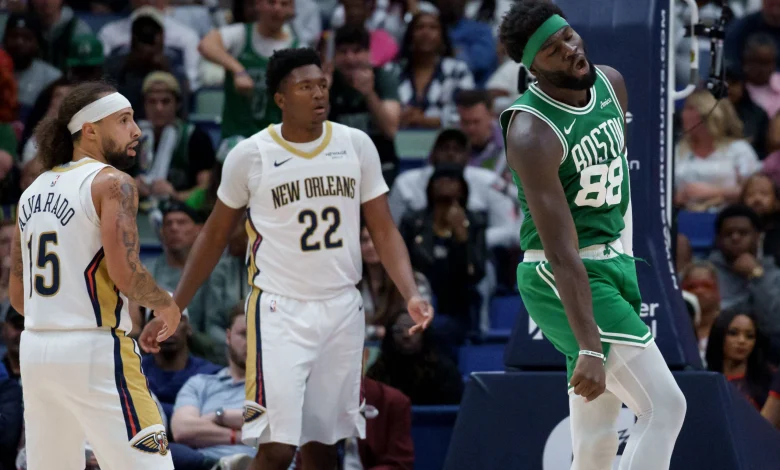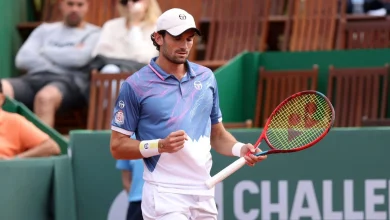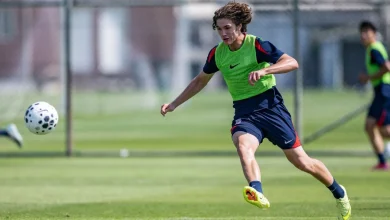Neemias Queta Talks About New Life as an NBA Starter for Celtics

NEW ORLEANS — Neemias Queta wears a steady expression on his face whether he’s playing poorly or thriving. A big play will occasionally shake that demeanor, chest-bumping Josh Minott so hard in Detroit he fell to the ground. Those who watched EuroBasket remember his ejection for flexing too hard in his opponent’s face after a physical finish underneath the rim. The Portuguese run brought more emotion out of him than usual.
“Oh man,” he said, remembering the play recently. “I don’t even wanna talk about it … I put myself in that position at the end of the day.”
Queta typically keeps his composure, and as his life as an NBA starter begins, he’s learning he can’t ride highs-and-lows. After his best game of the season — six points, 11 rebounds and four blocks in the Celtics’ first win at the Pelicans — he leaned back in his chair in the locker room and chilled with headphones in. He didn’t prove anything yet. But he responded.
Understandably, a league-worst defensive rebounding rate through Boston’s first three games fell on him as the biggest body on the floor. He accepted that as part of his new responsibility as the Celtics’ starting center. Nothing else surprised him about his new role, but it has forced him to focus more on remaining even-keeled. Joe Mazzulla tried to prepare him for the difference between the comfortable lifestyle as a backup, where you can play hard and probably won’t decide games, versus in the starting lineup, when you own almost everything.
“I think it’s all about staying even-keeled like you said, but at the same time, we knew what we needed to get better at,” Queta told CLNS Media. “We were doing great stuff. Like I said, great first possession defensively, we just couldn’t corral it with rebounds. We were playing really hard, we were getting good looks, sharing the ball, shots weren’t falling, but we were still looking for shooters … this league will humble you, and you just gotta stick with it. I’ve been humbled a bunch of times in this league. Like I said, it’s always about playing with your emotions and not letting them get the best of you … be ready for the next one. That’s the good thing about this league, you always got a game coming up in either one or two days, and you fight to bounce back.”
Queta led Boston’s offensive rebounding attack in the 122-90 runaway win, and while Luka Garza played the decisive stretch, Queta’s seven offensive rebounds keyed the way Mazzulla pictured the Celtics solving the team’s rebounding woes. They needed to crash the glass on the other end, he argued, and keep forcing turnovers because they had a better chance thriving in those areas rather than solving their roster deficiencies on the glass. The Celtic out-rebounded New Orleans, 16-11, on the offensive glass and scored a 23-16 advantage in second chance points.
They know it’s only a start, especially Queta, who never took a starting role for granted even as he emerged as the most likely candidate by far to replace Kristaps Porziņģis, Al Horford and Luke Kornet, who manned the center spot in recent years. He’s reflected several times, including in Portugal with CLNS over the summer, how he never expected to land in this position. Mazzulla worked throughout the previous year to convince him how good he can be while holding him to a high standard.
After starting on opening night, he pulled Queta only three minutes into the eventual loss against Philadelphia and center became a revolving door for the rest of the Celtics’ big men for the rest of the night until the final possession where Boston pulled all its bigs off the floor for a five-out attack. Queta fouled out with 1:42 remaining after having just scored eight points in two minutes prior.
“It’s pretty much the same (coaching style), everything they see, they’re proactive on it. They don’t let it slide,” Queta said. “I’m just trying to take it in and learn from whatever mistakes I make and we’re all in this together. Whenever I make a mistake, they’re here to help me get better and I’m just here to listen and try to apply that on the court.”
Queta combined for just 12 points in the prior two games while posting a 17.9% defensive rebounding percentage through a loss in New York where the Knicks hauled in 21 offensive boards. Among qualified players, he ranked tied for 39th for the season (19.6 DREB%) through the first four games. Jaylen Brown and Mazzulla placed it on the team’s collective effort, Brown blaming a few bad bounces, timing and getting pushed underneath the basket.
Those issues mounted late in the fourth quarter in Detroit, where eight second chance points swung the game in the Pistons’ direction during the final three minutes. Detroit hauled in five misses in a row down the stretch while Boston scored on five of their final six possessions, thwarting an almost certain comeback win. Garza filled those final minutes at center after Queta picked up a fifth foul earlier in the quarter. On the team fouling the sixth-most times per game in the NBA, Queta committed 4.3 per night.
Still, Mazzulla stuck with him as the starter through all four games so far, a good sign as the starting forward spot next to him began to change nightly and Mazzulla forecasted constant changes to the rotation. Mazzulla came away from Monday’s win impressed by his consistency. The way he faced up New Orlean’s bigs in the post, blocking and re-directing shots repeatedly became a major factor in another solid showing of first effort defense. And when the game finished, Boston maintained a 54-35 edge on the boards.
“He’s gotten better every game,” Mazzulla said. “He’s obviously stepped into a tough role, but I think he’s gotten better every game. Tonight, it was impactful plays, connectivity plays, an offensive rebound and sprint down the floor to block a shot. A defensive rebound, sprint down the floor and set a good screen. He’s just making connected plays and building on the great plays that he’s had in the first couple of games and it’s just gonna be a habit. It’s can’t be, just go out there and do it a couple of times. You gotta build a habit of doing it, and tonight, he showed a better version of himself as he continues to grow and he takes that serious. We need him to keep getting better.”
Queta’s ascendance to the starting role came at a challenging time in both Celtics and NBA history. The same tactic that Boston used to accentuate its own recent playoff runs, crashing from the corners and using offensive rebounding pressure to stop transition plays the other way, has become a league-wide phenomenon. The data increasingly shows, Mazzulla said, that crashing doesn’t hurt, and actually helps your transition defense.
The Pelicans were the latest opponent who embraced that philosophy, entering ranked sixth in offensive rebounding rate, and saw defensive rebounding as a clear Celtics weakness, and have turned up the heat on their interior. The Pelicans tried it throughout the night with Derik Queen, Yves Missi and recently-signed De’Andre Jordan. Among all the things Boston took for granted from Jayson Tatum, his rebounding proved the most underrated aspect of his game. The Celtics have missed it badly, alongside all the bigs that departed in the summer.
“We lost four All-Stars last season between Al, Jrue, Kristaps and then J.T. being out,” Brown said. “Luke’s an All-Star to me. Luke’s an All-Star in all of our hearts, but we lost some big time players. We didn’t lose one guy, we lost five, so to replace those guys does not happen overnight, I’ll say that, and it doesn’t happen in a week either. We gotta build some chemistry, we gotta build some identity and adopt a new style of play. I believe in this group, I believe that we have the potential, but it takes a little bit of time. I’m looking forward to growing with this group.”
After the Pistons loss, Mazzulla turned to Josh Minott at the four for what became a more effective rebounding tandem alongside Queta. The pair also found ways to spark Boston’s transition attack, which lagged through the early losses. Mazzulla also acknowledged that their scheme impacted their ability to secure stops, with bigs sometimes positioned further from the rim and their more aggressive pick-and-roll coverages leading to rotations that can free opposing crashers.
Mazzulla scaled those back late in Monday’s win, and for a moment, Queta received the praise. Ahead of a matchup with Evan Mobley and Jarrett Allen, he didn’t bask in it, but starting was never certain for him coming into this year. So he did take a moment to embrace how special his opportunity is.
“It’s pretty good, it’s really good to have these moments,” Queta said. “I’m trying to embrace them. It’s surreal. Looking back, I didn’t think I would be in this position, but I gotta embrace it and make the best out of it.”





